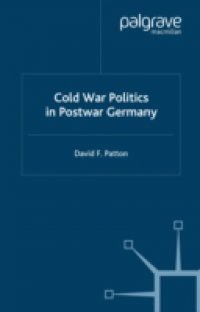During the Cold War, the Federal Republic of Germany (FRG), a divided nation on the front-line of the East-West confrontation, came down with pneumonia every time the superpowers sneezed. Due to the East-West confrontation splitting Germany in two, the Cold War remained irrevocably linked to the question of German unity. In The Politics of Foreign Policy in Post-War Germany, David Patton develops the links between Cold War international pressures, and German domestic coalitions. The book examines a politics in uncertain times, with three major shifts in Cold War relations disrupting politics-as-usual in the Federal Republic. In the early 1950s, external pressures led to a wrenching internal debate over rearmament. Twenty years later, the thaw in Cold War tensions set the stage for a fierce domestic showdown over detente with Eastern Europe. In the early 1990s, Chancellor Helmut Kohl took full advantage of the end of the Cold War to implement his controversial unification policy. At each juncture, the Federal Republic experienced intense debates over national unity, the increased stature of the chancellor in the policy-making process, the emergence of new domestic alliances and a sudden foreign policy reversal. Patton's examination of these three periods reveals how the Federal Republic has changed, yet stayed the same, in the post-war era.

